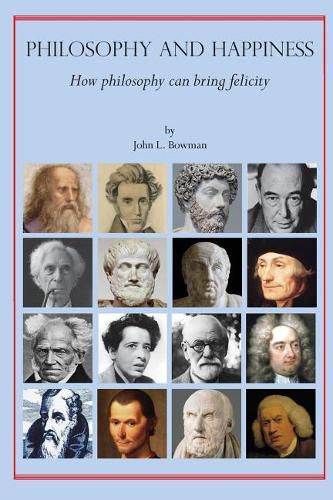Readings Newsletter
Become a Readings Member to make your shopping experience even easier.
Sign in or sign up for free!
You’re not far away from qualifying for FREE standard shipping within Australia
You’ve qualified for FREE standard shipping within Australia
The cart is loading…






Many philosophers believe people were made to be happy. Epictetus wrote that people should be happy because God made them that way–their lives should be free from hindrance and restraint. John Locke believed that happiness is the unavoidable concomitant of consciousness. However, philosophers also believed that happiness requires knowledge and effort. Coleridge wrote that people are what they know, which for the philosopher is people’s source of happiness. It is the knowledge humans have that forms the attitudes they hold that are the foundations of happiness. For the philosophers, happiness also requires effort–people were made for it but not with it. Cicero in his Tusculan Disputations wrote that the happy life rests upon humans alone–people are responsible for their own happiness, Shakespeare wrote that there is nothing either good or bad, but thinking makes it so, Boethius wrote nothing is miserable unless people think it so and Seneca wrote the world is as one make it. Happiness then is an art that must be learned and practiced to be achieved. Philosophy and Happiness presents the knowledge the philosophers say brings happiness.
Some book themes include fate and happiness (no man is happy until he is dead, until then only lucky), effort and happiness (the world is as one makes it, so fashion good judgments and make it a place that brings joy), purpose and happiness (be a ship with a rudder), appreciation and happiness (everyone can choose whether to view the glass half empty or half full–appreciate any volume) and fortune and happiness (have proper judgments of externals and do not invest in the wheel of fortune).
$9.00 standard shipping within Australia
FREE standard shipping within Australia for orders over $100.00
Express & International shipping calculated at checkout
Many philosophers believe people were made to be happy. Epictetus wrote that people should be happy because God made them that way–their lives should be free from hindrance and restraint. John Locke believed that happiness is the unavoidable concomitant of consciousness. However, philosophers also believed that happiness requires knowledge and effort. Coleridge wrote that people are what they know, which for the philosopher is people’s source of happiness. It is the knowledge humans have that forms the attitudes they hold that are the foundations of happiness. For the philosophers, happiness also requires effort–people were made for it but not with it. Cicero in his Tusculan Disputations wrote that the happy life rests upon humans alone–people are responsible for their own happiness, Shakespeare wrote that there is nothing either good or bad, but thinking makes it so, Boethius wrote nothing is miserable unless people think it so and Seneca wrote the world is as one make it. Happiness then is an art that must be learned and practiced to be achieved. Philosophy and Happiness presents the knowledge the philosophers say brings happiness.
Some book themes include fate and happiness (no man is happy until he is dead, until then only lucky), effort and happiness (the world is as one makes it, so fashion good judgments and make it a place that brings joy), purpose and happiness (be a ship with a rudder), appreciation and happiness (everyone can choose whether to view the glass half empty or half full–appreciate any volume) and fortune and happiness (have proper judgments of externals and do not invest in the wheel of fortune).